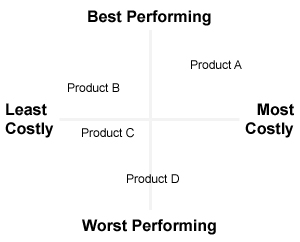Many often associate the term “product audit” with “quality audits.” A quality audit is an inspection of a product—whether a cleaning solution, paper product, or detergent—before it is delivered to a supplier or customer. However, hoteliers should not only check the quality of products that have already been delivered but also determine if those supplies, in particular, are the best for the job. That’s where product audits come into play.
 Here’s an example of how a hotel can conduct a product audit: A hotel currently uses four cleaning products for floors. Three housekeepers, one housekeeping supervisor, and a hotel administrator meet to help determine if all four floor cleaners should continue to be purchased or if they can narrow the products down to just one. The housekeepers rate each of the floor cleaning products based on their effectiveness and performance. The administrator analyzes each product’s cost. This information is then compared using a spreadsheet or plotted such as in the image on the left.
Here’s an example of how a hotel can conduct a product audit: A hotel currently uses four cleaning products for floors. Three housekeepers, one housekeeping supervisor, and a hotel administrator meet to help determine if all four floor cleaners should continue to be purchased or if they can narrow the products down to just one. The housekeepers rate each of the floor cleaning products based on their effectiveness and performance. The administrator analyzes each product’s cost. This information is then compared using a spreadsheet or plotted such as in the image on the left.
Based on the diagram above, Product C and Product D can be eliminated—while they are the least costly, their lack of effectiveness and poor performance works against them. The team must then decide between Product A and Product B. Product A is the all-around favorite according to the housekeepers, however, it’s also the most expensive. Product B performs almost as well as Product A and is less expensive. As a result of this product audit, all parties decide to continue purchasing Product B and eliminate the other three.
The Benefits of Conducting Product Audits
Product audits can be conducted for all types of items. One thing to keep in mind is that these items must all be used for the same or similar purpose. Further, when it comes to costs, hoteliers must be very careful. While two gallons of floor cleaning solution, for instance, may cost the same, the label could reveal that the dilution ratios are not comparable. A highly concentrated product would likely last longer and be more cost-effective in the long run. Using a free online dashboard system or working with an astute distributor can help uncover these savings for hoteliers.
The benefits of product audits range from saving space to ensuring the safety of staff. Storing one cleaning solution take a lot less space in a closet than four different ones. And different cleaning solutions may have different safety concerns, so minimizing the number of products helps ensure staff safety. What’s more, working with just one cleaning solution would make training easier than learning how to dilute and apply four different products.
Often, when a product audit is conducted, it is the first time that hoteliers examine exactly how much a product costs in comparison to similar products used for the same purpose, and the first time those products are seriously ranked by effectiveness. The cost savings can be significant and hoteliers can benefit even more from discounts and rebates for purchasing larger quantities of a single product.
Conducting a product audit is not difficult. Analyzing a number of products can take time, but the benefits can be substantial, making it time well spent.

About the Author
Michael Wilson is vice president of marketing for AFFLINK, a global supply chain optimization company and developer of ELEVATE, which provides clients with process and procurement solutions to drive efficiencies.





